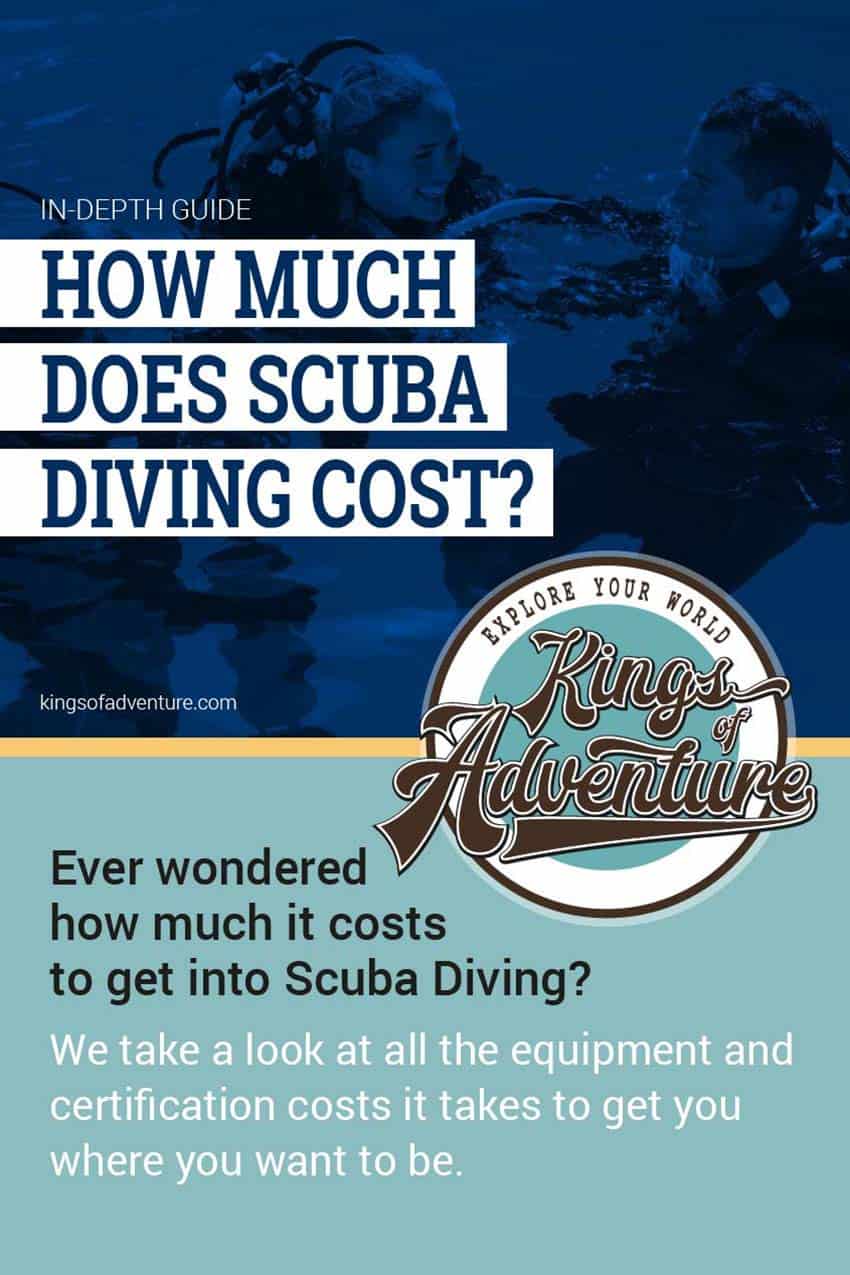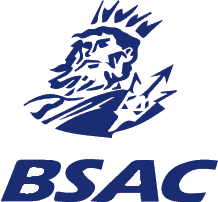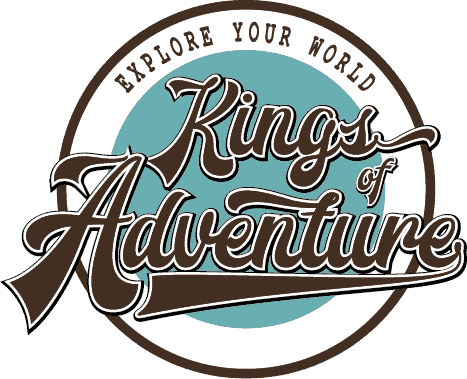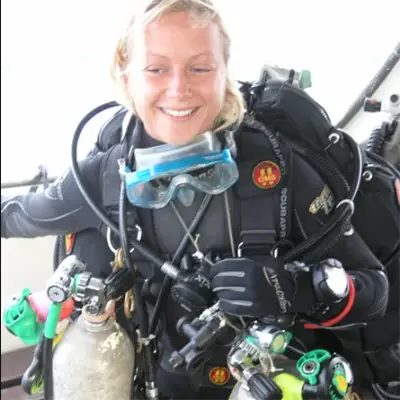To arrive at this article, scuba diving has no doubt caught your eye and you are feeling the draw of the ocean. One of the first things you’re going to be asking is, ‘How much does it cost to get started with Scuba?’ How much is the certification?, the gear? and anything else you might need. From where you are standing it all looks quite alien and confusing – and what if you spend a bunch of money and don’t like it?

Can I Try Scuba Diving Before I Buy?
Fear not, scuba diving centers understand that uncertainty and all will have a program that will allow you to give scuba diving a try before you commit to a full course or buy any gear.
Taster programs range from a quick dip in a pool to a full dive in the ocean which would include some basic theory and skill development too. My advice would be to shop around and get the most experience from your taster that you can.
In popular diving and beach holiday locations, it will be easy to find this kind of experience, and it’s a great way to get your fins wet, blow some bubbles and enjoy the reef without a significant amount of fuss and investment. In fact, many people enjoy multiple experiences like this before committing to a full course.
For Tasters That Include A Dive In The Ocean, You Can Expect To Pay Anywhere From US$80-130.
How Much Is Scuba Diving Certification?
If you’ve had a taste, or are ready to plunge straight in then your first requirement is a certification (c-card) or license. There are many scuba diving agencies that you can choose to certify with and this in itself can be confusing.
You will have heard of PADI and maybe SSI, NAUI, BSAC too. There are many others; my advice would be to not get too caught up in this. A dive agency creates course outlines for instructors and materials like videos, books and online training tools for students. They sell these, along with the certification card, to dive centers and charge a fee to dive centers and instructors to be part of their association.




All agencies have to adhere to a governing body that set minimum standards for each course at each level. The only real difference between them is how they structure and present what is essentially the same thing. Think about it, how can the science and skills that you require to be a competent open water diver be any different?
Do note that whatever agency you certify with, your license is valid to dive anywhere in the world with any dive operator regardless of their affiliation. Further, if you learn to dive with one agency it doesn’t mean you have to do all future courses with them; each agency has a minimum entry requirement for each course which takes into account training attained with other organizations.
When choosing who to learn with, find an operator with great reviews, great safety record and one that takes the time to answer all of your questions. Meet the team and look for professionalism, experience as well as nurturing of new professionals. Get a feel for the place; you want somewhere patient, inclusive and welcoming, with a great program of events and activities to ensure you have plenty of options to dive after your course.
Opt for these qualities rather than affiliation to a particular agency.
How Much Are Scuba Diving Courses?
With all agencies, you can break these parts down and even do them in different locations with different dive centers and instructors – as long as you complete all three portions with the same agency. So for example, most agencies now offer you the flexibility to learn the theory online or via an app.
All entry level scuba courses have three components:
- Theory development
- In-water skill development in shallow water
- Open water dives.
Costs For This Range From US$70-180 (With PADI Being The Most Expensive).
You could then use a dive center local to you for your theory review and shallow water work.
Expect To Pay Around US$ 170-250.
Prices will vary depending on what is included, which agency and the location.
Again prices for your open water dives are going to vary based on your location, where you need to go etc.
I Would Budget For Between US$250-350.
Check out the video below for an insight into PADI’s open water dive course.
If you are learning to dive with a center local to you, it is likely that they will run trips to complete your course, but you might want to finish your course on holiday. The choice is yours but do remember that taking the whole course with one operator will get you a better deal.
Breaking your course up will mean that your course takes longer too.
Dive centers located in holiday destinations typically schedule courses over 4-5days.
You Can Expect To Pay Between US$300-600 Depending On Location.
Do remember that you can still lighten the load by taking your theory online before you jet off on holiday. Most dive centers based in holiday destinations appreciate that you don’t want to spend your hard earned holiday in a classroom. Check what’s included, in some cases the e-learning components will cost a little extra.
Regulations do differ, but for any scuba course, you will be required to complete a medical form. If you have any of the conditions listed on the form, then you will need medical clearance to dive.
In some locations, regardless of what you state on the form you will still need medical clearance stating that you are fit to dive.
The cost of the medical isn’t included in your course fee so do check what you need to do. It is possible that your doctor will be able to help you but the center might have a dive physician offering a preferential rate.
How Much Does Scuba Gear Cost?
While you are training you will most likely be able to rent the equipment you need, and most centers include this cost within the price of the course, but it is worth checking. Do note that some centers will require you to buy some items, but this is usually limited to a mask, snorkel, and fins.
Regardless, if you’ve enjoyed your course and feel that you are going to keep diving then a mask, snorkel and fins are the items of scuba gear I would recommend buying first.
The key thing to remember when purchasing these items is comfort and fit; make sure you get good advice.
Masks Range From US$20-200
Fins From US$20-250
Snorkels From US$6-70
Most centers will offer a package and may give you a discount if you have completed training with them but make sure you buy what is right for you.
No matter how spectacular the dive, a leaking mask or uncomfortable fins will spoil it.
Next, I would dive. Hire gear and enjoy the ocean, this will allow you to get some experience but also familiarize yourself with different equipment options. You will then be more informed to choose your next pieces of equipment. You will have had some time to see what you do and don’t like and what features are important to you. You will also have had time to consider how often and where you are likely to do most of your diving as this will influence what you buy.
A dive computer is a pretty safe bet in terms of investment.
It’s easy to take anywhere, and many dive operators insist on one. The cost of hiring one is usually on top of a BCD, regulator and wetsuit package and can run up quite a charge.
You Could Spend Anywhere Up To US$2000 On A Computer But Something In The US$150-300 Range Is Perfectly Adequate.
What exposure protection you buy will depend on what temperatures you are buying it for.
A 2mm Shorty Wetsuit Can Be Purchased For US$50 Whereas A 7mm Semi-Dry Suit Can Cost US$700.
Drysuits And Accessories Range From US$1000-3000.
Comfort and fit are key to your choice; buy the exposure protection most suitable for the temperatures of the water where you will dive the most often.
BCDs Start At Around US$180, And You Can Spend Up To US$1300, However, You Will Be Able To Get A Great BCD For Well Under US$500.
Think again about your comfort but also the features you have enjoyed, maybe you appreciate large pockets and have a preference for weight and trim pockets. This is why it’s good to get diving first, so you know what you like.
Regulators deliver your air and so are all about the ease of delivery. Simply put, the more expensive the regulator, the easier it will claim to breathe.
Centers often have some options that you can take out for a dive so that you can try before you buy and feel the difference.
Again You Could Spend Up To US$2000 On This Bit Of Kit Yet The Other End Of The Range Is US$300.
Dive centers will often package BCD and regulator sets.
Next come your accessories like a dive bag, slate, torch, knife, and SMB. Again there’s quite a range in cost but do remember, dive bag aside, these things are easily lost, and you shouldn’t spend more on them than you are willing to lose. No knife is worth risking your life to retrieve!
How Can I Get Value For Money When Buying Scuba Gear?
You don’t want to skimp but spending unnecessary dollars on an item just because of its titanium finish is a bit silly. You could spend that money on diving instead. Further, there are some bargains to be had. Retailers often reduce end of line items when the manufacturers revise their models. There’s nothing wrong with the ‘old’ models; the retailer will only have room for a certain number of lines and will want to sell them off to make space.
Dive shows are also great places to pick up a bargain; the competition for your hard earned dollars is high, and this drives some great prices. If you can control yourself to the final few hours to make your purchases, even better, most would prefer to sell their stock than pack it up and take it home. You do run the risk of the item being out of stock, but it is worth a go.
Another thing to watch out for is a center replacing their rental kit. When they do this, the old rental gear will be sold off at bargain prices. Some centers replace their gear annually! If you’re diving with this center, you will have some familiarity with the kit and their standards. Regardless, in cases like this, you should find that the gear comes fully serviced.
Can I Buy Scuba Gear In Stages?
Do remember you don’t need everything straight away, and in fact, you don’t need to buy everything ever! For sure you need a certification if you are going to get the most out of diving and you are most likely to want to take further training too.
A comfortable set of mask, snorkel, and fins would be your minimum investment in gear. What you buy next depends on where you are going to dive. If you are only going to dive on holiday once or maybe twice a year, consider if it’s worth buying any more gear at all as this will entail carrying with you, paying excess luggage costs and servicing annually. In this case, you might just choose to invest in a wetsuit and maybe a computer and some accessories that you find useful as these are often not available to rent.
Your Advanced Course Is Going To Cost US$300-500.
If, on the other hand, there’s a thriving dive community close to home and you will dive regularly then investing in gear makes sense. It will pay for itself in rental cost savings and ensure a greater level or comfort and confidence due to the familiarity you have with it.
Wrap up
While scuba diving is not cheap, none of us choose a hobby based on its cost. We choose based on our interest and desire. There is a cost of entry, but this can be tailored to both your budget and the frequency you are going to indulge.

